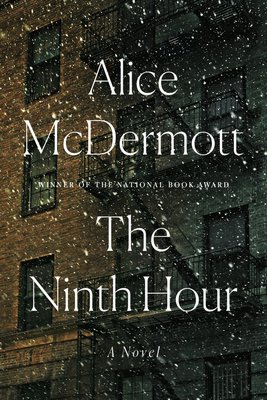
Alice McDermott’s new novel, “The Ninth Hour,” (Farrar, Straus, and Giroux, 247pp., $26) could be described as a novel about nuns. “Nuns?” the prospective reader asks. “How can one possibly find material for a novel in the life of a nun, whose life is so circumscribed?” You would be surprised. In extreme moments, this novel contains a suicide and a murder.
The fictional order of nuns in Ms. McDermott’s novel is called The Little Nursing Sisters of the Sick Poor. As their name implies, they tend to the ills of the poor who cannot afford medical care. They go from tenement to tenement in an early 20th century Irish Brooklyn neighborhood.
The novel begins with the suicide of a young BRT trainman, Jim, who has lost his job and has a child on the way. He turns on all the gas taps in his apartment. Sister St. Saviour, who had been collecting alms at Macy’s, sees the commotion outside the house and smells the fire that had been extinguished. She stops to see what had happened. She quickly takes charge of the care of the young widow and even attempts to get the young man buried in sacred ground, something the Catholic Church does not allow. She has no success, but she does find a job for the young widow, Annie, at the convent, working with the wonderfully named Sister Immaculata in the convent’s laundry room. The young man’s death threads its way through the texture of the novel in unspoken ways.
The child, Sally, is raised in the convent and the constant presence of nuns leads her to think that she has a vocation. She accompanies Sister Lucy on her rounds as Sister Lucy tends to some of the indigent who they are committed to help. One of those is Mrs. Costello, whose leg has been amputated after having been bitten by a rabid dog. She greets Sister Lucy and Sally with an avalanche of kvetching. Sally is convinced, when she is of an age, that she has a vocation and the nuns send her off to Chicago to enter the novitiate. The train trip is unpleasant, to say the least. She finds herself face to face with the dregs of humanity and begins to doubt if she has a vocation, much less the stomach to care for these lost souls.
On the train she finds herself sitting next to a large, coarse, foul-smelling woman, who “gave off the smell of artificial violets and, just behind it, cooking oil.” The woman announces that she is leaving her husband. When she finds out that Sally is going to be a nun, she mocks her innocence and tries to shock her as she complains about her husband’s small endowment, telling Sally that he cannot satisfy her.
She then meets another woman in the dining car who, counting on Sally’s innocence and kindness, manages to con her out of a portion of the money Sally was supposed to bring to the Chicago convent. After these encounters, Sally realizes that she does not have the vocation that she thought she did. These experiences “showed her the truth of the dirty world, showed her that her own impulse was to meet its filthy citizens not with a consoling cloth, but with a curse, a punch in the face.” She returns to Brooklyn the next day.
Ms. McDermott is a brilliant stylist, writing a prose that is crystalline and often poetic. She has written seven previous novels, one of which, “Charming Billy,” won a National Book Award, and three of which were nominated for the Pulitzer Prize.
The ninth hour of the title is traditionally one of the canonical hours, an hour of prayer in the middle of the day. It represents the time that Christ died on the cross. It is the time that Jim committed suicide. It is the time that Annie dallies with Mr. Costello, the milkman, the husband of Mrs. Costello, of the amputated leg. I will not give away who is murdered, or how. I leave that to the reader.
It is tempting to think of this as a Catholic novel, and thus parochial. It is a Catholic novel. But there is a universality in its themes that transcends Catholicism. The characters experience love, loss, faith, doubt, weakness, the reality of sin and the balm of compassion. The nuns are delineated with a pointillist care. Their personalities and struggles, while not Shakespearean, are nevertheless real, and we can empathize with them. Sally fairly leaps off the page in three dimensions. In the end, it is clear that Ms. McDermott loves these characters. That love is infectious.